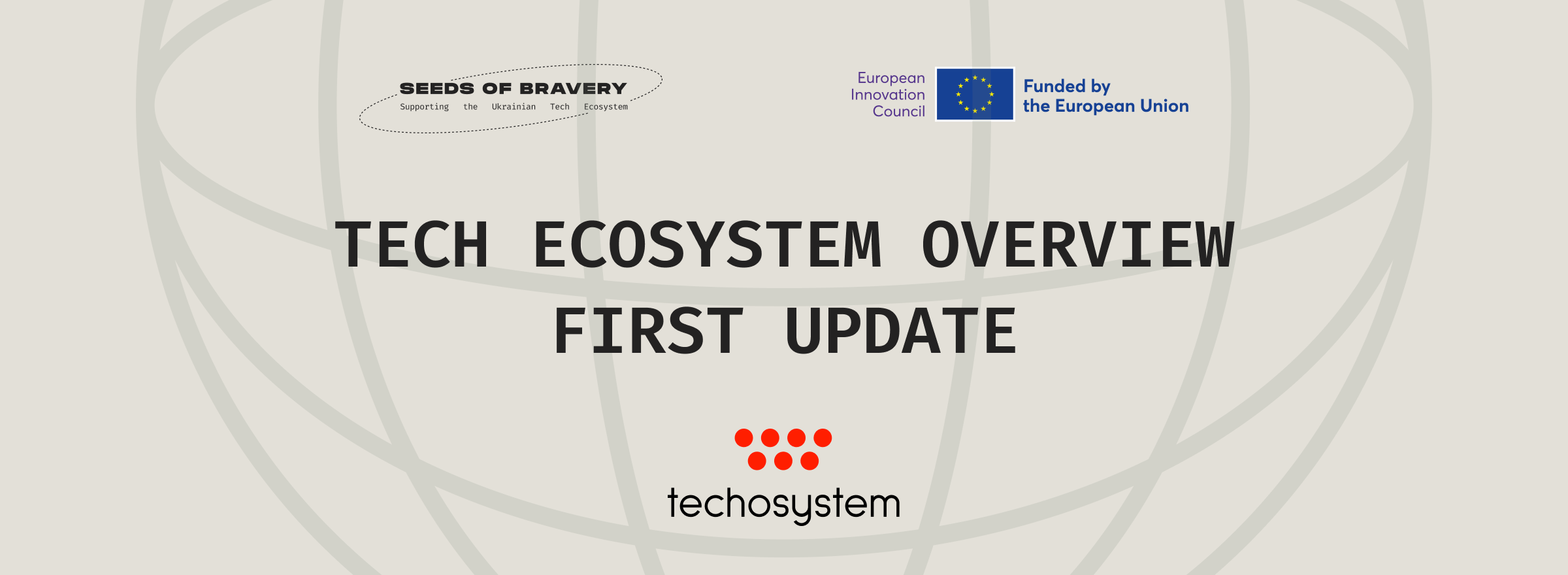The first study of the deep tech sector and its prospects for integration into the EU market has been completed as a part of the Seeds of Bravery project

Kyiv, 04.11.2024 – As part of the UASEEDs project, the Seeds of Bravery website and the Ukrainian Tech Ecosystem Overview platform by Techosystem have presented new research on the Ukrainian deep tech sector titled “Tech Ecosystem Overview – First update”, which has provided valuable insights into the current needs and conditions of the sector. The study, conducted using both quantitative and qualitative methods, highlights the potential and challenges faced by Ukrainian startups on their way to integration into the EU market.
Methodology and Key Findings
The quantitative survey was conducted from June 5 to July 12, 2024, covering 44 companies, and was complemented by in-depth interviews with representatives of 10 deep tech startups from April 24 to July 17, 2024. The findings reveal trends related to team sizes, funding, and growth stages of startups. Specifically, 54.8% of the surveyed companies reported having up to 10 employees, and 42.9% employed between 11 and 50, indicating steady development. One company reported a team size of 101–250 employees, highlighting the potential for continued growth.
Growth Trends: Technologies and Sectors
Participating startups operate across several sectors, including healthtech, fintech, and agrifoodtech. A significant portion (40.9%) is at the early commercialization stage, while 38.6% are actively expanding. More than half (51.2%) have secured external funding, and 39.5% are actively fundraising. Key technologies among Ukrainian startups include artificial intelligence, blockchain, quantum computing, and bioengineering. Some startups are developing solutions to support Ukraine’s defense and recovery efforts.
Opportunities for EU Integration
The study’s findings indicate that many Ukrainian deep tech startups have strong potential for entry into EU markets, especially through international grant programs and business incubators. Challenges for these startups — from scaling to securing additional investment — underscore the importance of building more structured teams and enhancing collaboration with European partners. Such integration would strengthen both the Ukrainian and European innovation ecosystems, driving advancements in critical sectors like defense, sustainability, and healthcare.
The “Tech Ecosystem Overview – First update” report covers the following sections:
- The Ukrainian deep tech sector: Industries, Markets, and Characteristics. This section provides insights into the founding years of startups, the main industries they operate in, and team sizes, offering a comprehensive view of their scale and activity profiles.
- Products and Services of deep tech startups. An overview of products, business models, and market strategies of Ukrainian deep tech startups, showcasing their innovation and growth plans both domestically and internationally.
- Teams. This part examines team composition, roles, levels of engagement, and gender distribution, offering insights into the management and staffing structures of these companies.
- Origins of deep tech startups. An exploration of the motivations behind founding these startups, the formation of core teams, and development stages (whether the idea or market need emerged first), helping to understand their foundational strategies and provide guidance to new entrepreneurs.
- Attributes of deep tech startups. A review of the distinguishing features of deep tech, including innovation and potential market demand, highlighting the technological maturity of the respondents and their positioning in the Ukrainian market.
- Funding in the deep tech sector. An analysis of startup activities around fundraising, including the volume of capital raised, future funding needs, capital-raising strategies, and company valuations.
Role of the Research
This first study of the Ukrainian deep tech sector highlights a diverse range of startups employing advanced technologies such as AI/ML, blockchain, and quantum computing. Many of these companies are actively engaged in international grant programs, work with investors, and contribute to Ukraine’s defense and recovery efforts. Grants remain crucial for supporting scientific research, as investors tend to favor market-ready products.
Secured funding enables startups to expand into new markets and access the mentoring essential for growth. Despite the challenges posed by the pandemic and the ongoing war, the Ukrainian deep tech sector continues to innovate, making a valuable contribution to the global tech ecosystem.
About “Seeds of Bravery”:
The UASEEDs project’s main goal is to create a pan-European network that bilaterally supports both the integration of Ukrainian technology innovators into European ecosystems and their activities in Ukraine.
The “Seeds of Bravery” consortium consists of 17 partners and 2 associate partners: Aalto University, Accelerace, CorkBIC, Da Vinci Labs, Innov8, Erasmus Centre for Entrepreneurship, EIT Health, FundingBox Accelerator, Impact Hub Stockholm, Institute of Physics of the National Academy of Science (EEN Network), Luxinnovation, Plug and Play Tech Center, Sunrise Valley Science and Technologie Park (Sunrise Tech Park), Techosystem, Ukrainian Startup Fund, Vacuum Deep Tech Acceleration, YEP.
The project complements the ongoing initiatives of the European Research Area for Ukraine (ERA4Ukraine), Horizon4Ukraine and ERC for Ukraine, as well as a special €25 million scholarship scheme under Marie Skłodowska Curie Actions (MSCA) for refugee researchers from Ukraine.
About Techosystem:
Techosystem is a civic union of the Ukrainian tech ecosystem players for startups, scaleups, and investors. The mission of Techosystem is to unite stakeholders to build a strong innovation ecosystem in Ukraine, fostering the growth of participant businesses and attracting investments to the technology sector.
Funded by the European Union, under the European Innovation Council (EIC). Views and opinions expressed are however those of the author(s) only and do not necessarily reflect those of the European Union or European Commission. Neither the European Union nor the European Commission can be held responsible for them. UASEEDs project has received funding from the Horizon Europe Framework Programme under grant agreement No 101104445.

